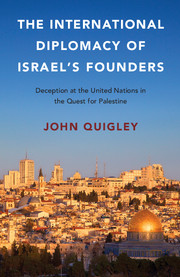 The International Diplomacy of Israel's Founders
The International Diplomacy of Israel's Founders Published online by Cambridge University Press: 05 January 2016
On February 25, 1947, British Foreign Secretary Ernest Bevin stood before the House of Commons in London to say that Britain had failed to find any solution for Palestine. “The course of events has led His Majesty's Government to decide that the problem of Palestine must be referred to the United Nations,” Bevin announced. “The problem of Palestine is a very vexed and complex one. There is no denying the fact that the Mandate contained contradictory promises,” Bevin conceded. “In the first place it promised the Jews a National Home, and, in the second place it declared that the rights and position of the Arabs must be protected. Therefore, it provided for what was virtually an invasion of the country by thousands of immigrants, and at the same time said that this was not to disturb the people in possession. The question therefore arose whether this could be accomplished without a conflict, and events in the last 25 years have proved that it could not.” The only respect in which Bevin's statement was not forthright was contained in this last sentence. Bevin made it appear that it took the British government twenty-five years to realize that it had taken on contradictory and irreconcilable obligations. As we saw in Chapter Three, it had known that since at least 1923.
Britain's solution was to ask the newly formed United Nations to devise a solution for Palestine. In April 1947, Britain asked the United Nations to formulate proposals on Palestine. The Charter of the United Nations did not make it entirely clear what powers the United Nations had to deal with Palestine, but Britain had run out of solutions on its own. As a permanent member of the UN Security Council, Britain would not be entirely out of the picture. The Security Council deals with threats to the peace, and Palestine appeared headed for trouble.
The Jewish Agency immediately geared up to encourage the United Nations, in line with the Biltmore Program, to make Palestine into a Jewish state. Realism required, however, that it allow for the Arabs to have a state as well, so Palestine would have to be split. The matter would go to the General Assembly in the first instance, and votes on what were considered “important questions” required a two-thirds majority.
To save this book to your Kindle, first ensure no-reply@cambridge.org is added to your Approved Personal Document E-mail List under your Personal Document Settings on the Manage Your Content and Devices page of your Amazon account. Then enter the ‘name’ part of your Kindle email address below. Find out more about saving to your Kindle.
Note you can select to save to either the @free.kindle.com or @kindle.com variations. ‘@free.kindle.com’ emails are free but can only be saved to your device when it is connected to wi-fi. ‘@kindle.com’ emails can be delivered even when you are not connected to wi-fi, but note that service fees apply.
Find out more about the Kindle Personal Document Service.
To save content items to your account, please confirm that you agree to abide by our usage policies. If this is the first time you use this feature, you will be asked to authorise Cambridge Core to connect with your account. Find out more about saving content to Dropbox.
To save content items to your account, please confirm that you agree to abide by our usage policies. If this is the first time you use this feature, you will be asked to authorise Cambridge Core to connect with your account. Find out more about saving content to Google Drive.